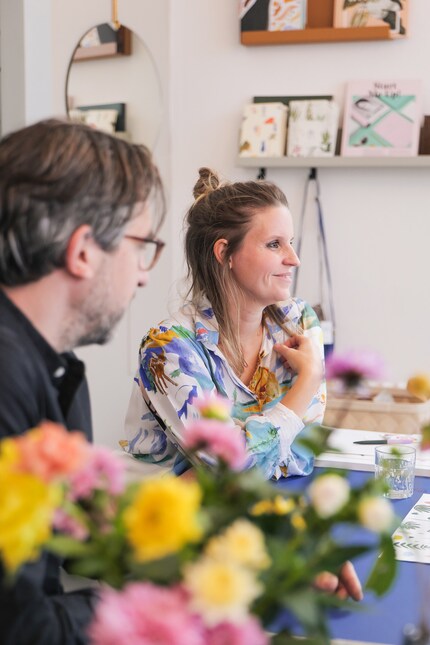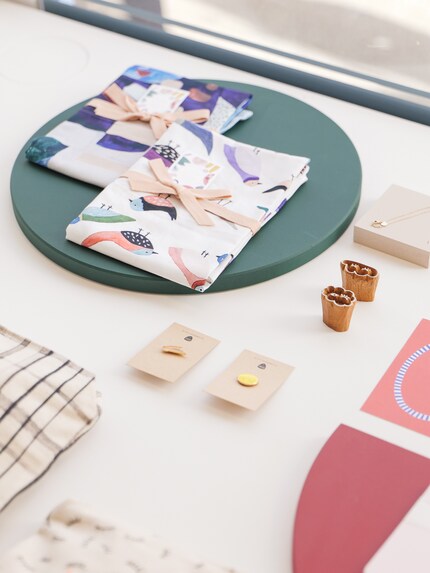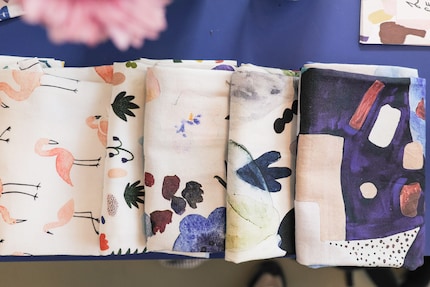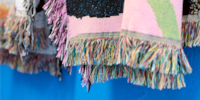

"We don't want to be known - we just want to offer a sustainable product"
Transparency in the textile production chain is essential for the founders of the "Na'is" label. Franziska and Damian Carnevale know everything about how their products are made in India. In this interview, they explain how they manage quality assurance despite the distance.
The founding couple of "Na'is" and the associated company "Beyond Textiles" met in Switzerland and fell in love in India. For ten years, Franziska and Damian Carnevale have spent almost every second together, utilising their creative partnership for joint projects. Textile design, interior design, two own brands, a concept store in Switzerland and an office in India. A lot comes together. During my visit to their studio and shop in Baden, I find out how they manage it all and what the pitfalls of self-employment are.
How did you get to know each other?
Franziska Carnevale: We worked for the same textile company in Switzerland for four years. When Damian moved to India, I visited him on one of my business trips. Three months later, we became a couple.
When did you found Beyond Textiles and how did it come about?Damian Carnevale: I realised early on that I didn't just want to be a traveller in India. That's why I worked for a few years for a company that is a pioneer in the production of organic cotton. I was responsible for Supply Chain Management and checked whether suppliers fulfilled ecological and social requirements. I wanted to start my own business in this area at some point. I just needed a few more customers. In 2010, the time had come. I founded the company "Beyond Textiles" in India. A year later, I registered the limited company in Switzerland. Franziska joined two months later. We lived in India for the first ten years of Beyond Textiles. When our children reached school age, we went back to Switzerland.[[image:39809182 "Damian has been fascinated by the textile industry in India since his first trip as a twenty-year-old."]]
What services does Beyond Textiles offer?D: We started with apparel and developed textiles for streetwear brands such as Zimtstern. Later came Interio and Pfister for home textiles. At some point, we wanted to be more than just a converter and design our own collections. This is how the now six-year-old label Lili Pepper and the new addition Na'is came about. Twice a year, we design collections for external customers based on the mood boards. The rest of the time we dedicate to our own brands.
Who takes over what in the process?
F: We both take on the search for ideas. Damian visits our fabric suppliers in India at least twice a year and researches what new fabrics are available. He has a feel for proportions and recognises exciting fabric structures. I make the drawings by hand - without having a product in mind beforehand. I first scan or photograph the raw material. Then I start working with it and enlarge or repeat the illustrations. Damian and I then develop the product. For designs such as a tea towel, I was able to transfer the original drawing to the format one-to-one.

D: People are often surprised when they learn that the prints were originally drawn by hand. Most people assume that Franziska illustrates on the computer. This sets us apart from other brands and ensures that the products don't all look the same.
How is the fabric printed once the design is finalised?
D: Some of our kitchen towels are created using block printing, for example. For this wood printing process, we send Franziska's hand drawing to our wood carver Sri Ram in India. He carves the motif and prints it onto the fabric by hand.
F: Watercolour paintings, on the other hand, are created using digital printing. This makes it easier to reproduce watercolour gradients and you can also feel the difference. The fabric is softer with this process because the colour bonds with the textile. We use screen printing for patterns without colour gradients. I am limited with this method because only up to eight colours are possible. [[image:39809244 "A rare printing process in the digital age: block printing, also known as wood printing."]] [[image:39809205 "Franziska now has almost 2000 illustrations, which she stores in piles in her studio."]]
You produce everything in India. How do you keep track of everything from a distance?
D: We know all of our suppliers personally and work with certified companies that fulfil social and environmental standards. They purchase, weave and print the organic cotton yarn. Depending on the product and manufacturing process, they are GOTS- certified. The companies also agree that you can visit the factory unannounced at any time. Our six employees, including our two merchandisers Ranganath and Praveen and the three quality controllers Gautam, Krishna and Venkatesh are always checking on things. We hear from each other every day via Skype. They would report to us if there are any irregularities.
Are you sometimes on site too?
D: I'm actually in India three times a year. That's not possible right now because of corona. It's also not easy for our employees to go to work at the moment. Moving from one state to another is difficult. Individual neighbourhoods are often closed due to the rising coronavirus cases. One of our employees once had to disguise himself as a labourer to cross the border in a vegetable cart and go to the office.
Have you ever considered producing in Switzerland?
D: As a self-employed person, I was happy to have low fixed costs in India at the time. In case something went wrong. Today, it is the speed in the Indian textile centres that is incomparable. In India, there are so many ways to develop a product. It's different here. We would have had to search all over the country for a weaver, dyer and printer. That's why we wouldn't have made progress so quickly. Nevertheless, we are not ruling out Switzerland and the neighbouring countries as a production location. We are currently considering having certain products made in Italy and Portugal.
How is the collaboration as a couple working out?
F: We enjoy spending a lot of time together, even if we perhaps don't go out together as much as we used to. It helps that we're both independent. Your partner understands if you go back to the studio on a Saturday evening instead of going to a restaurant.
D: Of course, there are also differences of opinion. But it's rare that one person wants to go to the cinema and the other prefers to work. We resolve conflicts quickly and then forget about them again.

How do you deal with mistakes?
D: We have a healthy error culture. Both with us and with our employees and suppliers. In India, things sometimes go a little differently than planned. Instead of picking at the problem, we prefer to think about the solution. There are few suppliers who work with such attention to detail as we do and produce small quantities like ours. We can't keep changing our partners all the time.
F: Once, for example, 2000 products were incorrectly labelled. We went into the warehouse ourselves to apply new labels. It was more important to us to maintain a relationship based on partnership than to charge the supplier for the costs and put them in financial difficulties.
What are the other hurdles to self-employment?
D: You have to be able to cope with losing orders and not panic straight away. When we came back to Switzerland, we lost a few customers. It was important for them to be able to visit us on site. We had a small house with a showroom in Bangalore. The buyers loved looking at the collections on our sunny veranda. However, most of them accepted the change and new customers joined us. We are very grateful for that. Since then, we know: Another door is opening somewhere else.
F: The biggest hurdle for me is organising the little time I have. From the design process to communication with customers, suppliers and the team to administrative tasks - everything has to be done. Every customer who comes in would prefer to have the work done yesterday. Then you also have to have room to develop something new at some point. Fortunately, as a self-employed person, I have the freedom to finish something in the evening.

D: Sometimes, however, it is difficult to draw the line. As long as the work is enjoyable, we are happy to work more. We are driven by both the team and our producers in India. We want them to do well and to enjoy working for us. We need them and vice versa. Without them, there would be no Beyond Textiles.
Can you imagine ever being an employee again?
D: It's a very competitive environment. You have to be prepared to work a little harder than others. In return, you get a lot of freedom. If you're successful, it's a great feeling. Of course, there is the saying: "The grass is always greener on the other side." This thought resonates from time to time.
What motivates you nonetheless?
F: That we have been able to work so freely and flexibly for ten years. That makes us a bit more relaxed. It also makes us happy to see our products in someone's home by chance. Especially when you know how many steps and hands a product has gone through. We also make a lot of things for external customers that don't have our name on them.

Don't you mind that your name as a designer remains anonymous for external commissions?
F: Fashion design has always been too extroverted for me. I feel more comfortable in textile design because you can be involved and remain anonymous. If your fabric appears in a Chanel collection, nobody will know that you developed it.
Has that ever happened before?
F: Yes, a few years ago. I was designing fabrics for an Italian company at the time. One of my designs suddenly went into production. When I wanted to know who had ordered it, I was told that Karl Lagerfeld had chosen it. There was no big fuss at the time. If I hadn't asked, nobody would have told me either.
D: You don't get paid more at times like that. For such companies, these are everyday customers. As an individual, however, you can only become famous by setting up your own design studio. Franziska could now put her name behind it. To this day, it's not so important for either of us to be the centre of attention. Our aim is to produce a high-quality product that is created under fair and sustainable conditions. It doesn't matter how famous we become with it.
Like a cheerleader, I love celebrating good design and bringing you closer to everything furniture- and interior design- related. I regularly curate simple yet sophisticated interior ideas, report on trends and interview creative minds about their work.
Interesting facts about products, behind-the-scenes looks at manufacturers and deep-dives on interesting people.
Show all

